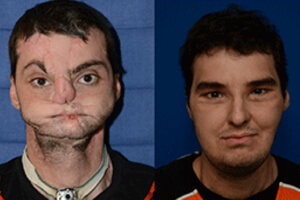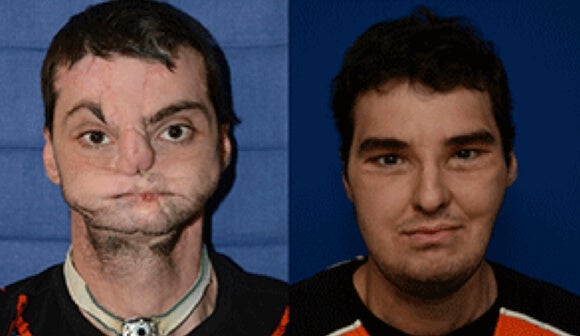Since first becoming available in 2005, 28 people have undergone a full or partial facial transplant—a procedure described by Dr. Eduardo Rodriguez as the “Mount Everest” of medical-surgical treatments.
Rodriguez is a plastic and reconstructive surgeon and senior author on a recent study that found facial transplants are fairly safe, becoming more viable, and clearly improve quality of life. None of the 22 men and 6 women have chronically rejected new organs and tissues; 25 are still living; and 4 went back to work school.
Rodriguez notes that though there have been some complications, the few deaths among patients were due cancer and infection not directly related to the procedure. Most of the patients are “thriving” and returning to social lives they had withdrawn from.
“Without facial transplantation as an option, many of these people would be at serious risk for severe depression, even potential suicide,” Rodriguez says.
Doctors select only patients with the most severe disfigurement—from bear bites, gunshot accidents, and severe burns—ineligible for other surgical reconstruction.
The procedure itself is expensive, about $300,000, not including post-procedure costs. Patients must commit themselves to a lifelong schedule of immunosuppressive drugs to prevent tissue rejection. Success depends on “total compliance” of post-procedure medication, follow-up care and rehabilitation, and strong family support.
Dr. Rodriguez notes because facial transplants are life-changing not life-saving, ethical considerations of subjecting young, otherwise healthy individuals to transplants must be taken into account and careful selection is critical.
Because many of those who most need to procedure are victims from fire, police, and the military, Rodriguez thinks it can be argued we have a “moral imperative to restore them to society.”
“We are still very much in the early days of facial transplantation,” says Dr. Rodriguez. “So long as our patients need it—and they do—then, it is our medical duty to continue to advance science and medicine, and improve how we perform the procedure so that it is more widely available to future generations of people whose severe disfigurements go beyond the means of conventional surgery.”
Looking years ahead, it isn’t a stretch to envision how the success of facial transplants will likely transition into cosmetic procedures. The continuing rise of and dependence upon facial recognition software means a bounty of ethical issues and privacy concerns await us all.
Read more at Science Daily: Facial transplantation: Almost a decade out, surgeons prepare for burgeoning demand
[Image: NYU Langone Medical Center]




